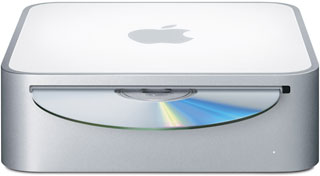With the latest model announcement from Apple, it seems that people are thinking more about building a “Hackintosh” than ever before. I can’t say that I blame them.
 I didn’t get the mini tower that I wanted, and the upgraded Mac mini is nice at best. My problem with the mini is that I don’t want to pay the laptop premium price to have small components in a desktop machine.
I didn’t get the mini tower that I wanted, and the upgraded Mac mini is nice at best. My problem with the mini is that I don’t want to pay the laptop premium price to have small components in a desktop machine.
Is It Legal?
The question of Hackintosh legality depends on Apple’s double whammy against clones, copyright, and EULA. I recently discussed the copyright aspect when I wrote about Psystar’s amended claims. If you have time, click on the link for all the details.
Copyright Law
The key point of that article is that you are allowed to modify the original and resell it, but the DVD is the original, and no one is going to easily modify that.
The second point is that copyright law understands that for software to work, a copy has to be installed on a computer. It specifically allows for you to install a copy. There is even language in the law that allows for adaptation to get the software to work. Installing a copy on the computer of your choice probably does not break copyright law.
End User License Agreement
This is where Apple’s EULA kicks in. They have you agree to a contract before running the software for the first time. That contact states that it can only be installed on Macintosh computers. To do anything else is a breach of contract. The only thing I see here is that breaking a contract is not the same as breaking a criminal law.
People break contracts all the time. It is neither a crime nor a sin. Sure, there can be penalties, but people don’t generally end up in jail over breaking a contract. Penalties would generally include things like compensatory damages, consequential damages, attorney fees, etc. So by no means is breaking a contract a trivial thing, but it’s not a crime.
The Digital Millennium Copyright Act
There is one final trick that Apple includes to protect itself. Apple uses encryption to give itself protection under the DMCA. Getting around this restriction can qualify as a crime, since a law has to be broken for the average person to get the decryption software to make an install work on generic hardware.
If you don’t try to resell or pirate your copy of Mac OS X, your right to install legally purchased software is potentially valid. I’d love to see this issue addressed in court to find out what is allowed in this situation.
Psystar’s Problem
![]() These three things together make it rather tricky for a company like Psystar to openly sell Hackintoshes. They face real penalties for breaking both the law and the contract. Psystar is arguing that Apple is illegally combining these for its protection.
These three things together make it rather tricky for a company like Psystar to openly sell Hackintoshes. They face real penalties for breaking both the law and the contract. Psystar is arguing that Apple is illegally combining these for its protection.
We’ll see what the courts have to say later this year.
A Different Story for Individuals
It remains a very different question if you do the install yourself and don’t try to sell the Hackintosh. There is a lot less that Apple can do to the individual Hackintosh owner.
This isn’t like pirated music, where millions of dollars are being “lost” and individuals may have pirated hundreds of songs. With a Hackintosh, at most we are talking one copy per person.
A handful of Mac enthusiasts are not likely to draw the attention of Apple’s lawyers. The legal cost to go after each individual over a single copy would be high. If a real movement were to start, then we would likely see Apple ratchet up the protection to its software before it tried to send out the lawyers.
Should you build your own Hackintosh? That’s up to you. You may be breaking the DMCA protection on Mac OS X. You will be breaking the EULA. But as I read copyright law, you do have the legal right to install software that you purchased.
Remember I’m not a lawyer, so check with a real lawyer if you have any questions.
Keywords: #hackintosh #psystar #eula
Short link: http://goo.gl/h6Pwfr
searchwords: psystar, hackintosh

